
Source: Chaperon2, Kenneth Whitley, Wikimedia
Expository scenes convey information that is important to understanding the characters, setting, and also the theme. In scenes that occur during the rising action, the story begins to quicken, and the tension and suspense intensify. For example, in “Little Red Riding Hood,” the Big Bad Wolf convinces Little Red Riding Hood to leave the path and pick some wildflowers for Grandma. This raises the tension because we know that Little Red Riding Hood’s mother warned her not to leave the path for any reason. Next, the Big Bad Wolf goes to Grandma’s, eats her, and dresses up like her, further increasing the tension and suspense. Now we know how the Big Bad Wolf plans to devour Little Red Riding Hood. The plot—the action of the story—has progressed.
Let’s look at the first scene from Jamaica Kincaid’s story “A Walk to the Jetty” to see another example of how specific scenes relate to the exposition of the story.
My mother had arranged with a stevedore to take my trunk to the jetty ahead of me. At ten o’clock on the dot, I was dressed, and we set off for the jetty. An hour after that, I would board the launch that would take me out to sea, where I then would board the ship. Starting out, as if for old time’s sake and without giving it a thought, we lined up in the old way: I walking between my mother and my father. I loomed way above my father and could see the top of his head. We must have made a strange sight: a grown girl all dressed up in the middle of a morning, in the middle of the week, walking in step in the middle between her two parents, for people we didn’t know stared at us. It was all of half an hour’s walk from our house to the jetty, but I was passing through most of the years of my life. We passed by the house where Miss Dulcie, the seamstress that I had been apprenticed to for a time, lived, and just as I was passing by, a wave of bad feeling for her came over me, because I suddenly remembered that the months I spent with her all she had me do was sweep the floor, which was always full of threads and pins and needles, and I never seemed to sweep it clean enough to please her.
 If you are unfamiliar with the story, what might you guess about the plot, particularly the exposition, from just this short excerpt? Use your notes to answer. When you are finished, check your understanding to see a possible response.
If you are unfamiliar with the story, what might you guess about the plot, particularly the exposition, from just this short excerpt? Use your notes to answer. When you are finished, check your understanding to see a possible response. Sample Response:
The main character in the story seems to be leaving the town where she grew up. She walks past places that have had meaning in her life.

In the following activity, choose the correct answer from the drop-down menu.
- By having her walk between her parents, the writer is showing us—
- The writer’s description of places that she has walked past all of her life—
The scene at the beginning of this short story supports the idea that this is an important event in the young woman’s life. Recounting the places where she has grown up and the experiences she has had as she makes her walk to the jetty supports the idea that she is walking toward her future, a very different place from her past.
Let’s look at another excerpt from the short story “The Egg” by Sherwood Anderson. Anderson leads us carefully through the exposition as he tells the story of a family whose hard luck seems to be literally and figuratively connected to eggs and chickens, or was it chickens and eggs?
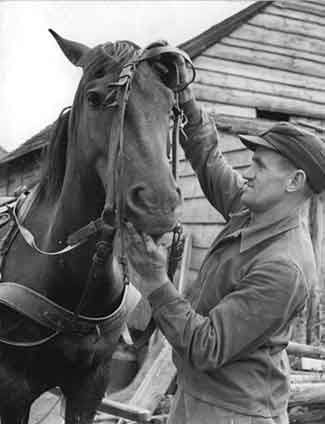
Source: Einzelbauer, German Federal
Archive,Wikimedia Commons
(Bundesarchiv,Bild 183-40790-0002 /
CC-BY-SA)
My father was, I am sure, intended by nature to be a cheerful, kindly man. Until he was thirty-four years old he worked as a farm hand for a man named Thomas Butterworth whose place lay near the town of Bidwell, Ohio. He had then a horse of his own and on Saturday evenings drove into town to spend a few hours in social intercourse with other farm hands. . . . At ten o’clock father drove home along a lonely country road, made his horse comfortable for the night and himself went to bed, quite happy in his position in life. He had at that time no notion of trying to rise in the world.
The writer leads us into the next scene below by writing that his father had no notion of trying to rise in the world. Because this is a story, and we know that there has to be conflict and tension for it to be successful, that last sentence is a signal that something is about to happen to make his father change his mind and try to better himself. Read the next excerpt from the story below.
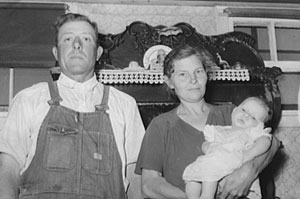
Source: Consolidated Catalina Amphibian, Calotype46, Flickr
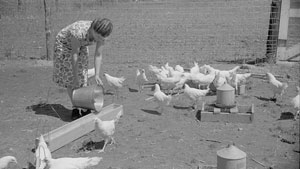
“Farmer’s wife feeding chickens, Scioto Farms, Ohio.” Arthur Rothstein, Library of Congress
It was in the spring of his thirty-fifth year that father married my mother, then a country school-teacher, and in the following spring I came wriggling and crying into the world. Something happened to the two people. They became ambitious. The American passion for getting up in the world took possession of them.
In the passage above, the last three sentences prepare us for the events of the rising action. We know the father’s life is going to change, perhaps in spite of himself.
The first venture into which the two people went turned out badly. They rented ten acres of poor stony land on Griggs’s Road, eight miles from Bidwell, and launched into chicken raising. I grew into boyhood on the place and got my first impressions of life there. From the beginning they were impressions of disaster and if, in my turn, I am a gloomy man inclined to see the darker side of life, I attribute it to the fact that what should have been for me the happy joyous days of childhood were spent on a chicken farm. One unversed in such matters can have no notion of the many and tragic things that can happen to a chicken. It is born out of an egg, lives for a few weeks as a tiny fluffy thing such as you will see pictured on Easter cards, then becomes hideously naked, eats quantities of corn and meal bought by the sweat of your father’s brow, gets diseases called pip, cholera, and other names, stands looking with stupid eyes at the sun, becomes sick and dies. A few hens, and now and then a rooster, intended to serve God’s mysterious ends, struggle through to maturity. The hens lay eggs out of which come other chickens and the dreadful cycle is thus made complete. It is all unbelievably complex.
Thus begins the tale of a family ruled by chickens and eggs and bad luck. As the story progresses, the family moves from the failed chicken farm to another enterprise whose failure is ultimately connected to eggs in a surprising way.
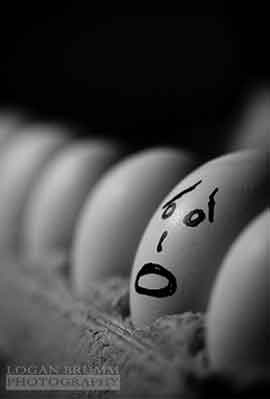
Source: “The line up”, Logun Brumm Photography and Design, Flickr
Father grinned and winked at his visitor. Joe Kane decided that the man who confronted him was mildly insane but harmless. He drank the cup of coffee that had been given him and began to read his paper again. When the egg had been heated in vinegar father carried it on a spoon to the counter and going into a back room got an empty bottle. He was angry because his visitor did not watch him as he began to do his trick, but nevertheless went cheerfully to work. For a long time he struggled, trying to get the egg to go through the neck of the bottle. He put the pan of vinegar back on the stove, intending to reheat the egg, then picked it up and burned his fingers. After a second bath in the hot vinegar the shell of the egg had been softened a little but not enough for his purpose. He worked and worked and a spirit of desperate determination took possession of him. When he thought that at last the trick was about to be consummated the delayed train came in at the station and Joe Kane started to go nonchalantly out at the door. Father made a last desperate effort to conquer the egg and make it do the thing that would establish his reputation as one who knew how to entertain guests who came into his restaurant. He worried the egg. He attempted to be somewhat rough with it. He swore and the sweat stood out on his forehead. The egg broke under his hand. When the contents spurted over his clothes, Joe Kane, who had stopped at the door, turned and laughed. A roar of anger rose from my father’s throat. He danced and shouted a string of inarticulate words. Grabbing another egg from the basket on the counter, he threw it, just missing the head of the young man as he dodged through the door and escaped.
Let’s think for a moment about the excerpts you just read from the Kincaid and Anderson stories. In the first one, Jamaica Kincaid used symbolism to fill in the blanks in the exposition; she had the protagonist take her final walk on the island positioned between her parents. She thought about the importance of the places she passed in her life as a child on the island. In a sense, her life “flashed” before her eyes as she made her final walk to the waiting ship.
 Using your notes, answer the following question. When you are finished, check your understanding.
Using your notes, answer the following question. When you are finished, check your understanding.In the second excerpted story, how does Anderson seem to move the reader between scenes?
Sample Response:
In the excerpt from “The Egg,” Anderson moves the reader from one expository scene to the next with careful explanations and transitions. These are two examples of ways that writers use exposition to prepare readers for events that take place during the rising action in a plot.
The last excerpt is from the story “The Frog and the Puddle” by Edna Ferber. The rising action in this scene leads to the climax of the story. Gertie, a young woman is a clerk in a department store, and she is tired and depressed after a long day on her feet.
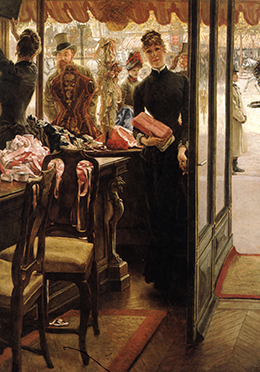
Source: James Tissot - The Shop Girl.jpg, Austriacus, Wikimedia Commons
Now clerking, as Gertie would tell you, is fierce on the feet. And when your feet are tired you are tired all over. Gertie’s feet were tired every night. About eight-thirty she longed to peel off her clothes, drop them in a heap on the floor, and tumble, unbrushed, unwashed, unmanicured, into bed. She never did it.
Things had been particularly trying to-night. After washing out three handkerchiefs and pasting them with practised hand over the mirror, Gertie had taken off her shoes and discovered a hole the size of a silver quarter in the heel of her left stocking. Gertie had a country-bred horror of holey stockings. She darned the hole, yawning, her aching feet pressed against the smooth, cool leg of the iron bed. That done, she had had the colossal courage to wash her face, slap cold cream on it, and push back the cuticle around her nails.
Seated huddled on the side of her thin little iron bed, Gertie was brushing her hair bravely, counting the strokes somewhere in her sub-conscious mind and thinking busily all the while of something else. Her brush rose, fell, swept downward, rose, fell, rhythmically.
“Ninety-six, ninety-seven, ninety-eight, ninety—Oh, darn it! What’s the use!” cried Gertie, and hurled the brush across the room with a crack.
She sat looking after it with wide, staring eyes until the brush blurred in with the faded red roses on the carpet. When she found it doing that she got up, wadded her hair viciously into a hard bun in the back instead of braiding it carefully as usual, crossed the room (it wasn’t much of a trip), picked up the brush, and stood looking down at it, her under lip caught between her teeth. That is the humiliating part of losing your temper and throwing things. You have to come down to picking them up, anyway.
Her lip still held prisoner, Gertie tossed the brush on the bureau, fastened her nightgown at the throat with a safety pin, turned out the gas and crawled into bed.
The writer places this scene at the point when the rising action begins to heighten our interest in the story. We want to know what happens next.